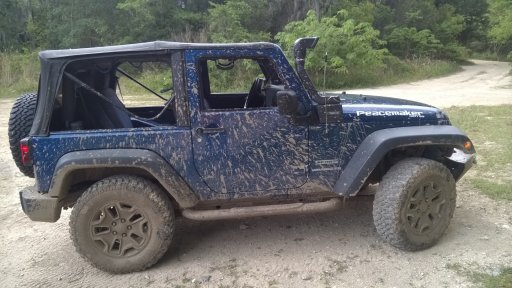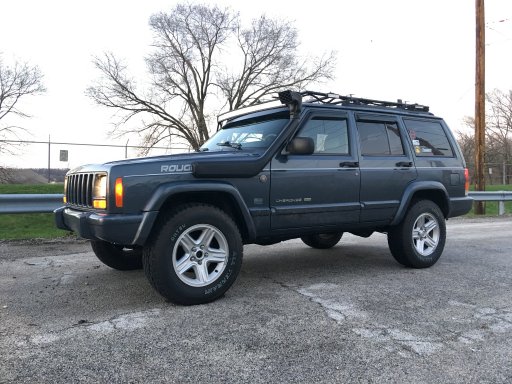Just thought I would start a topic snorkel related. Curious who has a snorkel and to why you now have a snorkel? What other water related precautions or "water related reliability mods" did you do before or after you decided to add a snorkel to your rig?.
I ordered a snorkel today, This is why
I met up with the guys a week ago for the Usual Saturday wheel at the local sand pits. We decided to explore a new area as it where, there was a puddle (small lake lol). I have the smallest rig of the bunch and the smallest tires being 31's. I followed Martin (TJ, 4.5" 33's Locked) through the puddle on what looked to be a shallow line. It was. Meanwhile Jerret (XJ, 5.5" Long arms, 35's locked, snorkel) nearly disappeared in the water about 30ft away he was on a mission anyways to submarine his XJ and try out his new snorkel. His XJ stalled so we where forced to cross slowly to pull out the dead in the water XJ. Martin was hesitant so I lead the way across because I'm an idiot mostly all well and good a few spots water came over the hood but my XJ didn't die. Martin winches Jerret's XJ out. We all played it safe after that and myself especially I followed the out side of the puddle around too the other side has to be shallower that way. Wrong. Fell into a hole, a deep hole, engine off, water rushing in through the doors. Wait to be rescued. Was a mess.
So having not actually damaged anything, besides my ego and some damp carpet my reason for the purchase of my snorkel was for insurance. Should I make a mistake or fall into a hole again I have the piece of mind that it won't cost me an engine.


I ordered a snorkel today, This is why
I met up with the guys a week ago for the Usual Saturday wheel at the local sand pits. We decided to explore a new area as it where, there was a puddle (small lake lol). I have the smallest rig of the bunch and the smallest tires being 31's. I followed Martin (TJ, 4.5" 33's Locked) through the puddle on what looked to be a shallow line. It was. Meanwhile Jerret (XJ, 5.5" Long arms, 35's locked, snorkel) nearly disappeared in the water about 30ft away he was on a mission anyways to submarine his XJ and try out his new snorkel. His XJ stalled so we where forced to cross slowly to pull out the dead in the water XJ. Martin was hesitant so I lead the way across because I'm an idiot mostly all well and good a few spots water came over the hood but my XJ didn't die. Martin winches Jerret's XJ out. We all played it safe after that and myself especially I followed the out side of the puddle around too the other side has to be shallower that way. Wrong. Fell into a hole, a deep hole, engine off, water rushing in through the doors. Wait to be rescued. Was a mess.
So having not actually damaged anything, besides my ego and some damp carpet my reason for the purchase of my snorkel was for insurance. Should I make a mistake or fall into a hole again I have the piece of mind that it won't cost me an engine.













